Human, Monkey, Horse, Cow, Sheep, Pig, Rabbit, Canine, Rat, Mouse, Hamster, Guinea pig, Chicken, and Xenopus laevis Anti-GRP94 / HSP90B1 Antibody Product Attributes
Species: Human, Monkey, Horse, Cow, Sheep, Pig, Rabbit, Canine, Rat, Mouse, Hamster, Guinea pig, Chicken, and Xenopus laevis
Tested Applications: Flow Cytometry, Immunofluorescence, Western Blot, Immunohistochemistry (IHC).
Application Notes: Flow Cytometry (0.5-1ug of antibody/million cells in 0.1ml), Immunofluorescence (0.5-1.0ug of antibody/ml), Western Blot (0.5-1.0ug of antibody/ml), Immunohistochemistry (IHC) (Formalin-fixed) (0.5-1.0ug of antibody/ml for 30 minutes at RT)
Clonality: Monoclonal
Anti-GRP94 / HSP90B1 Antibody Clone: SPM249
Clone SPM249 Host and Isotype: Rat IgG2a kappa
Anti-Human, Monkey, Horse, Cow, Sheep, Pig, Rabbit, Canine, Rat, Mouse, Hamster, Guinea pig, Chicken, and Xenopus laevis GRP94 / HSP90B1 Positive Control Sample: U20S cells. About 50% of breast tumors express grp94 protein
Cellular Localization of Antibody Cytoplasmic, nuclear
Buffer and Stabilizer: 10mM PBS with 0.05% BSA & 0.05% azide.
Antibody Concentration: 200ug/ml
Antibody Purification Method:Protein A/G Purified
Immunogen: Purified glucose regulated protein 94 (grp94) from chicken oviducts
Storage Conditions: Store at 2 to 8° C (refrigerate). Stable for 24 months when properly stored.
GRP94 / HSP90B1 Previously Observed Antibody Staining Patterns
Observed Subcellular, Organelle Specific Staining Data:
Anti-HSP90B1 antibody staining is expected to be primarily localized to the endoplasmic reticulum.Observed Antibody Staining Data By Tissue Type:
Variations in GRP94 / HSP90B1 antibody staining intensity in immunohistochemistry on tissue sections are present across different anatomical locations. An intense signal was observed in cells in the endometrial stroma in endometrium, cells in the molecular layer in cerebellum, cells in the seminiferous ducts in testis, cells in the tubules in kidney, decidual cells in the placenta, endothelial cells in the colon, exocrine glandular cells in the pancreas, fibroblasts in skin, follicle cells in the ovary, germinal center cells in the tonsil, glandular cells in the adrenal gland, appendix, breast, cervix, uterine, colon, duodenum, endometrium, epididymis, fallopian tube, gallbladder, parathyroid gland, prostate, rectum, seminal vesicle, small intestine, stomach and thyroid gland, glial cells in the caudate nucleus, cerebral cortex and hippocampus, hematopoietic cells in the bone marrow, islets of Langerhans in pancreas, macrophages in lung, neuronal cells in the caudate nucleus, cerebral cortex and hippocampus, ovarian stroma cells in the ovary, Purkinje cells in the cerebellum, respiratory epithelial cells in the bronchus and nasopharynx, trophoblastic cells in the placenta and urothelial cells in the urinary bladder. More moderate antibody staining intensity was present in cells in the endometrial stroma in endometrium, cells in the molecular layer in cerebellum, cells in the seminiferous ducts in testis, cells in the tubules in kidney, decidual cells in the placenta, endothelial cells in the colon, exocrine glandular cells in the pancreas, fibroblasts in skin, follicle cells in the ovary, germinal center cells in the tonsil, glandular cells in the adrenal gland, appendix, breast, cervix, uterine, colon, duodenum, endometrium, epididymis, fallopian tube, gallbladder, parathyroid gland, prostate, rectum, seminal vesicle, small intestine, stomach and thyroid gland, glial cells in the caudate nucleus, cerebral cortex and hippocampus, hematopoietic cells in the bone marrow, islets of Langerhans in pancreas, macrophages in lung, neuronal cells in the caudate nucleus, cerebral cortex and hippocampus, ovarian stroma cells in the ovary, Purkinje cells in the cerebellum, respiratory epithelial cells in the bronchus and nasopharynx, trophoblastic cells in the placenta and urothelial cells in the urinary bladder. Low, but measureable presence of GRP94 / HSP90B1 could be seen inmyocytes in skeletal muscle and peripheral nerve in mesenchymal tissue. We were unable to detect GRP94 / HSP90B1 in other tissues. Disease states, inflammation, and other physiological changes can have a substantial impact on antibody staining patterns. These measurements were all taken in tissues deemed normal or from patients without known disease.Observed Antibody Staining Data By Tissue Disease Status:
Tissues from cancer patients, for instance, have their own distinct pattern of GRP94 / HSP90B1 expression as measured by anti-GRP94 / HSP90B1 antibody immunohistochemical staining. The average level of expression by tumor is summarized in the table below. The variability row represents patient to patient variability in IHC staining.| Sample Type | breast cancer | carcinoid | cervical cancer | colorectal cancer | endometrial cancer | glioma | head and neck cancer | liver cancer | lung cancer | lymphoma | melanoma | ovarian cancer | pancreatic cancer | prostate cancer | renal cancer | skin cancer | stomach cancer | testicular cancer | thyroid cancer | urothelial cancer |
|---|---|---|---|---|---|---|---|---|---|---|---|---|---|---|---|---|---|---|---|---|
| Signal Intensity | ++ | +++ | +++ | +++ | +++ | ++ | ++ | +++ | ++ | ++ | ++ | +++ | +++ | +++ | +++ | ++ | +++ | +++ | +++ | ++ |
| HSP90B1 Variability | + | ++ | ++ | ++ | + | ++ | ++ | + | ++ | ++ | ++ | + | + | + | + | ++ | ++ | + | + | ++ |
Limitations and Warranty
enQuire Bio's GRP94 / HSP90B1 Anti-Human Monoclonal is available for Research Use Only. This antibody is guaranteed to work for a period of two years when properly stored.

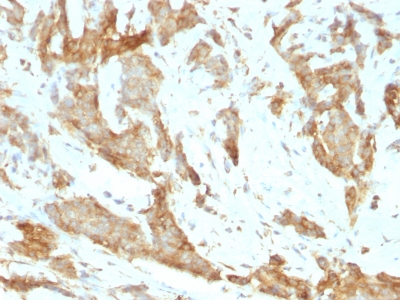


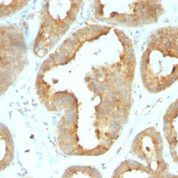
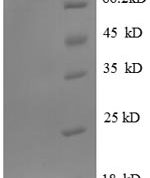
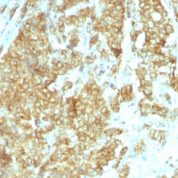
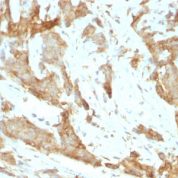
There are no reviews yet.